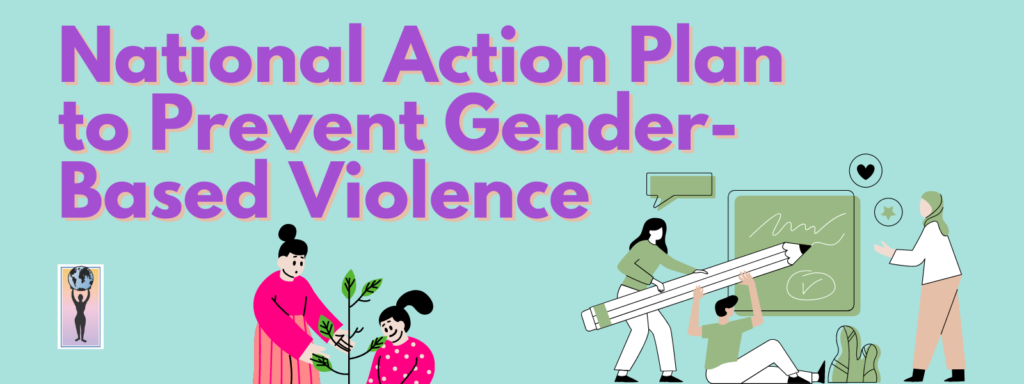Article and graphics by Indira D’Souza, IANGEL Summer 2021 Intern
The Biden Administration’s Executive Order to establish a White House Gender Policy Council represents a commitment to respond to and prevent all forms of gender-based violence (GBV). This Council will help to facilitate a future where women, girls, and people of diverse gender identities experience the human right to live free from violence. The Coalition to End Violence Against Women and Girls Globally, of which IANGEL is a member, welcomes the Biden Administration’s actions to address global gender-based violence. The Coalition has drafted a series of recommendations¹ to build upon the U.S. 2016 Government Gender Equality and Equity Strategy and work towards building a more peaceful world.
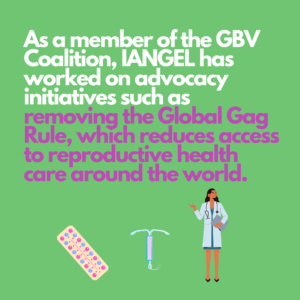 The Coalition to End Violence Against Women and Girls Globally is a group of more than 180 organizations working to promote the right to live free of fear and violence. The Coalition utilizes each member organization’s expertise and connections with local activists, engaging in education, advocacy, and collaborative work to ensure that building solutions to combat gender-based violence is a top priority. As a member of the Coalition, IANGEL has worked on advocacy initiatives such as permanently ending the Global Gag Rule, a policy that reduces access to reproductive health care around the world while undermining existing health care systems and infrastructure. IANGEL participated in advocacy campaigns encouraging Congress to pass the Global HER Act that will effectively end the Global Gag Rule and protect women’s reproductive health abroad.
The Coalition to End Violence Against Women and Girls Globally is a group of more than 180 organizations working to promote the right to live free of fear and violence. The Coalition utilizes each member organization’s expertise and connections with local activists, engaging in education, advocacy, and collaborative work to ensure that building solutions to combat gender-based violence is a top priority. As a member of the Coalition, IANGEL has worked on advocacy initiatives such as permanently ending the Global Gag Rule, a policy that reduces access to reproductive health care around the world while undermining existing health care systems and infrastructure. IANGEL participated in advocacy campaigns encouraging Congress to pass the Global HER Act that will effectively end the Global Gag Rule and protect women’s reproductive health abroad.
In its National Action Plan, the Coalition recommends maintaining and strengthening the 2016 definition of gender-based violence as “any harmful threat or act based on actual or perceived biological sex characteristics, gender identity and/or expression, sexual orientation, and/or lack of adherence to varying socially-constructed gender norms.” The 2016 definition emphasized that gender inequalities, patriarchy, and power imbalances are structural in nature. The definition can be strengthened by including non-binary and transgender identities, and specifying how violence against women and girls is only one subset of gender-based violence. The Coalition also recommends that any United States strategies align with international standards on human rights, including the Declaration on the Elimination of Violence against Women and the Convention on the Elimination of Violence Against Women. The U.S. government should prioritize gender-based violence prevention in diplomacy and capacity building abroad, while also funding international NGOs that have established protocols to prevent, address, and report on GBV.
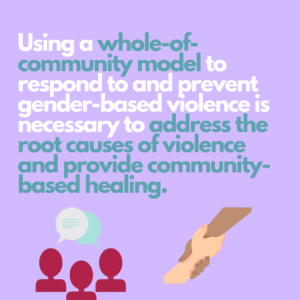
Next, the Coalition advises that gender mainstreaming be effectively implemented, using evidence-based strategies across U.S. government policy and programming. Funding for GBV interventions needs to be increased for programs which include a gender analysis within climate change and migration, among other issues. The Coalition advises that centering survivors is essential to GBV prevention. Survivors must be actively involved in policy making and implementation, and provided with trauma-informed care, awareness-raising, and safe and accessible health services. They also suggest that a wide range of local stakeholders must be engaged to create solutions, including men and boys. Early intervention programs that focus on children and youth, especially adolescents, can help to break cycles of violence. In this way, power imbalances may be shifted and rigid gender norms disrupted to address root drivers of violence. Using a whole-of-community model to respond to and prevent gender-based violence is necessary to address the root causes of violence and provide community-based healing.
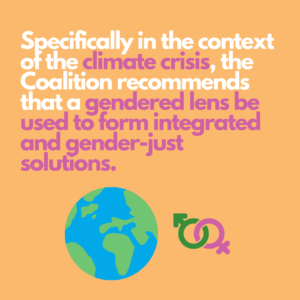
Finally, the Coalition suggests that gender-responsive and disaggregated data must be collected to use in research and gender-based violence mitigation efforts. Data collection must be intersectional and cover sexual and reproductive health, the workforce, community-based interventions, and climate change. These data will allow for more evidence-based approaches to decision making and resource distribution. In light of the emergencies occurring around the world (humanitarian, pandemic, conflict, climate, etc.), women and girls face lack of access to services and support. Specifically in the context of the climate crisis, the Coalition recommends that a gendered lens be used to form integrated and gender-just solutions. Environmental and human rights defenders must be protected and direct funding for gender-just climate solutions is needed to support grassroots and local organizing related to the environment.
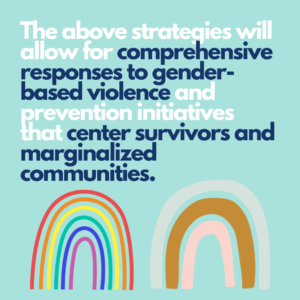
The above strategies are just a few of the strategies recommended by the Coalition that will allow for comprehensive responses to gender based violence and prevention initiatives that center survivors and marginalized communities. Improving these systems will help women and girls achieve economic advancement and empowerment, while involving community stakeholders and upholding human rights. IANGEL and the Coalition to End Violence Against Women and Girls Globally encourages the Biden Administration to take these recommendations under consideration to combat violence and further women and girls rights around the world.
¹ Coalition to End Violence Against Women and Girls Globally. (2021). Recommendations for the U.S. Strategy to Prevent and Respond to GBV Globally and the National Action Plan on GBV. PDF File.

